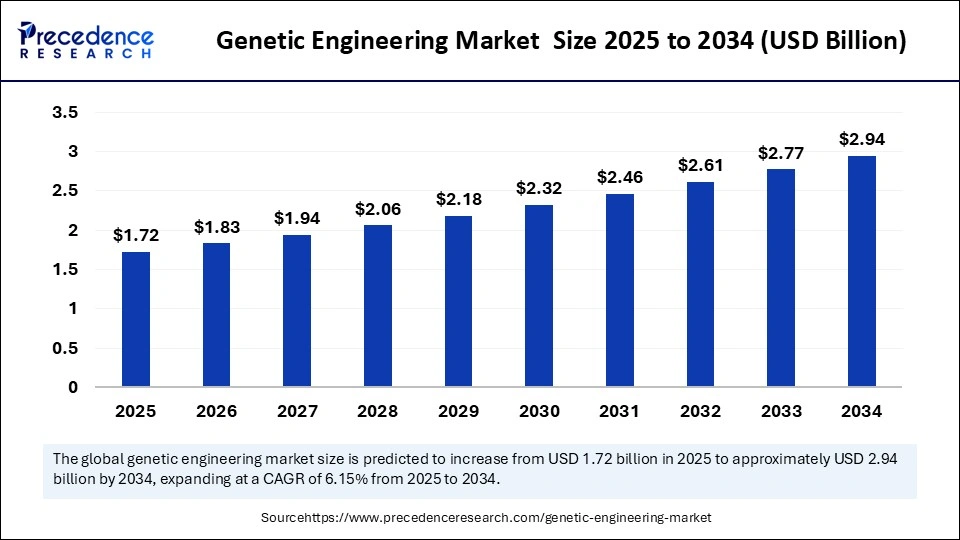
Genetic Engineering Market Key Takeaways
-
In 2024, North America led the global market, securing the largest share of approximately 41%.
-
The Asia Pacific region is projected to grow at the fastest pace throughout the forecast period.
-
Among products, the genetic markers segment was the top contributor to market share in 2024.
-
The biochemical segment is forecasted to experience notable growth in the coming years.
-
The PCR device segment dominated the market in 2024.
-
The gene gun segment is expected to register the highest CAGR during the forecast period.
-
By technique, gene splicing accounted for the largest share in 2024.
-
Artificial selection is anticipated to grow at the fastest CAGR in the forecast timeline.
-
The medical industry segment was the leading application area in 2024.
-
The agriculture segment is expected to expand rapidly between 2025 and 2034.
Market Overview
The genetic engineering market is experiencing robust growth, driven by groundbreaking advancements in biotechnology and molecular biology. This market encompasses a wide range of applications, including healthcare, agriculture, and industrial biotechnology, all aimed at modifying genetic material to achieve desired traits or outcomes. From genetically modified crops to gene therapies and precision medicine, genetic engineering is becoming a cornerstone of innovation in both life sciences and food production. The continuous expansion of research and development activities, coupled with rising investment from public and private sectors, is fueling market momentum globally.
Drivers
The primary drivers of the genetic engineering market include increasing demand for personalized medicine, advances in gene-editing technologies such as CRISPR-Cas9, and the growing prevalence of genetic disorders and chronic diseases. The agricultural sector is also witnessing significant adoption of genetically modified organisms (GMOs) to enhance crop yield, resistance to pests, and adaptability to climate change.
Additionally, the surge in biopharmaceutical development, especially in producing recombinant proteins and monoclonal antibodies, is driving demand for efficient genetic manipulation technologies.
Opportunities
The genetic engineering market presents immense opportunities in the development of novel gene therapies and synthetic biology applications. Personalized treatments that target specific genetic mutations are becoming more feasible, paving the way for breakthroughs in cancer treatment, rare diseases, and inherited conditions.
Agricultural biotechnology also offers opportunities for creating climate-resilient and nutrient-rich crops, addressing global food security concerns. Moreover, the emergence of artificial intelligence and big data in genomics is expected to streamline genetic editing processes, improving accuracy and reducing development time.
Challenges
Despite its potential, the genetic engineering market faces challenges such as ethical concerns, regulatory hurdles, and high development costs. Public apprehension about genetically modified organisms and potential unintended consequences of gene editing continues to affect market adoption, particularly in regions with stringent regulatory frameworks.
The complexity of biological systems also poses scientific challenges, as manipulating one gene can have cascading effects on other pathways. Additionally, disparities in access to genetic technologies between developed and developing countries can limit global market growth.
Regional Insights
North America leads the genetic engineering market, driven by strong research infrastructure, significant government funding, and a high concentration of biotech firms. The United States, in particular, has seen rapid adoption of gene-editing tools in both healthcare and agriculture. Europe follows closely, with active regulatory frameworks and investments in genomic research.
Asia-Pacific is emerging as a key growth region due to rising investments in biotechnology, supportive policies in countries like China and India, and increasing agricultural biotechnology applications. Latin America and Africa are gradually expanding their footprints, particularly in genetically modified crops.
Recent Developments
Recent developments in the genetic engineering market include the approval of new gene therapies for rare diseases, significant progress in in vivo genome editing, and the launch of next-generation sequencing platforms integrated with AI. Leading biotech companies are entering partnerships with pharmaceutical giants to accelerate gene-based drug development. In agriculture, new genetically modified crop varieties that are drought-resistant and high in micronutrients have been introduced.
Additionally, regulatory bodies are reevaluating their frameworks to accommodate rapid advancements in gene editing, particularly CRISPR-derived therapies.
Genetic Engineering Market Companies
- Thermo Fisher Scientific Inc.
- Lonza
- Cibus
- Recombinetics Inc.
- Sangamo
- Merck KGaA
- Precision Biosciences
- OriGene Technologies Inc.
- Intellia Therapeutics Inc.
- Caribou Biosciences Inc.
Segments Covered in the Report
By Product
- Biochemical
- Genetic Markers
By Device
- PCR
- Gene Gun
- Gel Assemblies
By Technique
- Artificial Selection
- Gene Splicing
By Application
- Medical Industry
- Agriculture
By Region
- North America
- Europe
- Asia Pacific
- Middle East & Africa
- Latin America